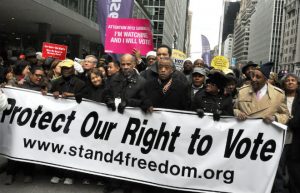 Under the apparently mistaken belief that legislatures make laws, lawmakers in several states attempted to protect the integrity of the voting process by requiring voters to present what most of them already have in their wallets: government-issued photo identification.
Under the apparently mistaken belief that legislatures make laws, lawmakers in several states attempted to protect the integrity of the voting process by requiring voters to present what most of them already have in their wallets: government-issued photo identification.
But judges have decided that some people, particularly black people, are either too stupid or lazy to obtain something they need to open a bank account, receive government welfare, rent an apartment, buy certain over-the-counter medication, board an airplane, etc.
Although the U.S. Supreme Court ruled that a photo ID requirement for voting was not unconstitutional or unreasonable, a court overturned these laws in North Carolina, North Dakota (as discriminatory against American Indians), and Texas. The court sent the Texas case back to the lower court to determined whether the law was meant to be “discriminatory.”
In Kansas, a judge ruled that the state must count upcoming votes from people who didn’t prove their citizenship when they registered to vote.
The Heritage Foundation’s Hans von Spakovsky and columnist John Fund wrote in the Wall Street Journal (emphasis added):
The basic charge is that these state laws were intended to, or would have the effect of, preventing voters, particularly minority voters, from casting ballots. Yet as Judge Jones said, “despite extraordinary efforts to find voters ‘disenfranchised’ by [the Texas law], the DOJ could not uncover any, and no representative of the plaintiff organizations found any of their members unable to vote” because of the law.
The same is true in North Carolina. The Justice Department was contesting that state’s voter-ID law, the elimination of same-day registration and out-of-precinct voting, and the state’s limiting early voting to “only” 10 days. The plaintiffs, in addition to failing to produce witnesses unable to vote because of these changes, produced no voter-turnout information to support their false claims. The actual turnout data show that voters were not kept out of the polls by any of these requirements.
An expert who testified in the North Carolina voter ID law case said blacks tend to be “less sophisticated” voters.
That’s not condescending at all.
“But as the district court had already discovered, black voters in North Carolina actually ‘fared better in terms of registration and turnout rates in 2014, after the new law was implemented, than in 2010, when the old provisions were in place.'”
But no matter. All is fair game in political racial pandering.
Photo credit: Michael Fleshman (Creative Commons) – Some rights reserved
 CURE News and Clergy Blog News and Commentary for Christians
CURE News and Clergy Blog News and Commentary for Christians



